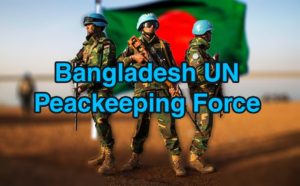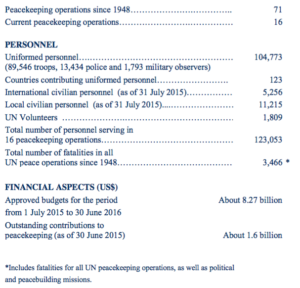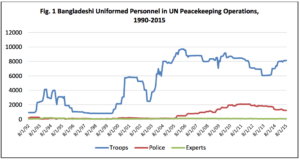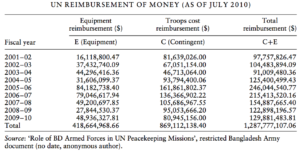UN Peacekeeping and Bangladesh

Krishna Kumar Saha
Abstract
UN Peacekeeping has never been so diversified before as it is right now. The nature and context of Peacekeeping missions of UN have changed several times. Also, it is no more of light footprint and truce supervision as it was before. Now it has become increasingly complex, demanding, and sometimes even extreme. Bangladesh is one of the highest contributors of personnel in the Peacekeeping operations since its participation from 1988. With the changing dimensions, Bangladesh started contributing more. On the other hand, this changing context has brought about new challenges for Bangladesh too. In this multidimensional perspective, this current paper will investigate the contribution and attainment of Bangladesh in UN Peacekeeping operations and possible problems.
Key Words: UN Peacekeeping; Bangladesh; South Asia; Politics; Military Benefits
Introduction
“To maintain international peace and security, and to that end: to take effective collective measures for the prevention and removal of threats to the peace.”
– Article I of the Charter of the United Nations
The Peacekeeping operations of United Nations are to ascertain international peace and security throughout the world. Peace and security are the first and most important mandate of UN according to the Charter of the United Nations article one (UN, 2016). Historically these peacekeeping operations used to be narrow regarding range and activities. However, due to the change of dimensions of global politics and the nature of international conflicts UN Peacekeeping has evolved in a dynamic way. It was, even more, dynamic after the end of the Cold War (Malan, 1998). Now peacekeeping is no longer limited to peacekeeping and peacebuilding rather to the assurance of human security, settlements of peace agreements, and development of the respective area (Yesmin, 2013, p. 3).
Likewise, Bangladesh is not only the active member of United Nations (UN) since its admission, but also it has become one of the highest contributors of personnel in the UN Peacekeeping missions (Kabir, 1999, p. 38). Also, 25th Article of Bangladesh’s Constitution says as a state Bangladesh will work for ‘promoting international peace, security, and solidarity’ (Bangladesh Government, 2016; Zaman R. &., 2014, p. 1; Asian Center for Human Rights, 2014, p. 7). This current paper will attempt to theoretically analyze the civil-military relations and how military interventions are minimized in civil decisions.
Methods
This article has identified two separate hypotheses to discuss. The first one is increased participation in UN Peacekeeping missions has decreased intervention of armed forces in domestic affairs in the country. Likewise, armed forces’ current activities in Bangladesh are the major challenge for further increase of the troops in UN Peacekeeping missions. The research question for this paper is, how armed forces participation in UN Peacekeeping Missions has decreased intervention in domestic affairs in Bangladesh? Simultaneously, what are the significant challenges ahead of Bangladesh Armed forces considering their role in internal affairs?
While conducting the research, this paper has used tools of qualitative research methods for data collection and analysis. This article has also employed literature survey and desk research to collect quantitative and qualitative data. Also, investigation of government documents, critical literature, personal observation, and insights has been added a different dimension to this paper. The key objective of the journal is to find the fundamental overview of the implications of Bangladesh’s involvement in UN Peacekeeping missions.
What is Peacekeeping Mission?
Peacekeeping as a concept evolved to prevent dispute, persuade opposition parties for dialogue rather than violence as well as bring about a peaceful solution to the conflict and build sustainable peace process around the world (Yesmin, 2013, p. 2; UN, 2016). It also includes lasting peace, observation of implementation peace agreement, electoral support, strengthening the rule of law, and economic and social development (Yesmin, 2013, p. 3). It specifically mentions that these operations involved forces but without enforcement powers to establish, maintain, and restore peace and security in the areas of conflict (UN, 2016).
Overview of UN Peacekeeping Missions
The peacekeeping operation consists of military, police, and civilian personnel, who work to deliver security, political and early peacebuilding support. According to the mandate of the United Nations and Charter, UN Peacekeeping missions are the high priority programs to the organization. Likewise, from 1948 to until now there were 71 Peacekeeping missions are held, and 16 are ongoing across the four continents. There are two departments in UN Peacekeeping mission (UN, 2016). The following table will show some facts and figures of UN Peace Keeping Missions.
Table 1: UN Peacekeeping Facts and Figures (UN, 2016)

Contribution of South Asia
UN Peacekeeping as one of the priority programs of UN none but South Asia as regions contributes 24% of its personnel. Among the six biggest personnel contributors (countries) in these missions, four are from South Asia. There are different arguments why countries from South Asia contribute much. However, regardless of the reasons, these countries are assisting in establishing peace in various conflict-affected areas of the world. The following figure will show the level of contribution from the South Asian countries in UN Peacekeeping missions. Not only that, as a signatory of the UN charter it is an international obligation to the world community to contribute to international peace security as a nation state.
Figure 1: Level of Contribution from South Asian Countries (UN, 2016)

UN Peacekeeping and Bangladesh
17 years after the independence of Bangladesh in 1988, 15 military personnel joined UN Iran–Iraq Military Observation Group (UNIIMOG) mission. That was the beginning. By 2013 this country became one of the biggest contributors of personnel of UN Peacekeeping missions. Until now Bangladesh has participated 52 peacekeeping operations in 40 countries. Nevertheless, 124 peacekeepers have died in operations.

Figure 2: Bangladeshi Personnel in UN Peacekeeping Operation 1990-2015 (Zaman R. &., 2014)
From the above graph, it can be seen that the number of experts in UN Peacekeeping Missions from Bangladesh remained steady from 1992 to 2015. Conversely, the number of troops has changed several times with ups and downs. In the case of Police, it remained stable from 1992 to 2005. From 2005 the number of police in UN Peacekeeping operations has increased (Zaman R. &., 2014).
Why Does Bangladesh Participate in UN Peacekeeping Missions?
By taking part in these missions Bangladesh, Armed Forces fulfills the country’s constitutional and international obligations. Involvement also helps to gain operational expertise and first-hand knowledge of latest doctrine and military equipment. Last but not the least, financial rewards represent a powerful incentive for Bangladesh to take part in UN Missions (Zaman R. U., 2013; Zaman R. &., 2014, p. 7). Banerjee identified, ‘the fulfillment of international obligations, the need to project a positive image of the country, diverting the armed forces’ attention away from any praetorian desire, subsidizing the Army with the reimbursement obtained from peacekeeping missions and the financial benefits derived by individual members of the armed forces as factors that explain Bangladeshi support for UN peacekeeping.’ (Banerjee, 2008)
With a similar argument, Murthy has emphasized the financial imperative for Bangladesh’s armed forces and linked this to the fact that they are now unwilling to overthrow the civilian government and usurp power (Krishnasamy, 2003). Some argue this participation in UN Peacekeeping missions with the term ‘self-actualization’ coined by American psychologist Abhram Maslow (Mamun, 2014). This current paper agrees with these arguments and explains the Bangladesh’s contribution and attainment in UN Peacekeeping focusing economic, political, prestige, and institutional benefits.
Economic Benefits
Due to limited domestic wages for the members of Armed Forces in Bangladesh, the UN compensation rates are attractive to the Bangladeshi soldiers and police. The study by Zaman and Biswas 2013, points out that most the respondents they interviewed from retired Armed Personnel emphasized on the financial remuneration from the UN. Financial rewards for the Air Force Officials are even much higher comparing to any other forces. One Air Force officer who flew UN aircraft in peacekeeping operations pointed out that he earned $3,000 per flying hour and that this was in addition to other perks and benefits (Zaman R. &., Bangladesh, 2013). The following figure will show the salary comparison between the pay in Bangladesh and salary in UN mission.
Table 2: Comparison of National and UN Salary Structure
| Rank (Equivalent in BD armed forces) | Salary in BD (USD) 1 USD = 78 BDT | Salary in UN mission (USD) |
| Lieutenant | 411 | 1,896 |
| Captain | 472 | 2,089 |
| Major | 576 | 2,289 |
| Lieutenant Colonels | 666 | 2,497 |
| Colonels | 769 | 2,708 |
Krishnasamy mentioned that the compensation has made the country’s foreign currency stock healthy and played an active role in the economy. Equally, Banerjee points out that these economic benefits play a major role in supporting the economy (Krishnasamy, 2003; Zaman R. &., 2014). The following table shows the UN reimbursement of money from 2001 to 2010 for both troops and equipment.
Table 3: UN Reimbursement of Money to GoB
Prestige
“Bangladesh, a country usually known for natural disasters, political instability and economic woes has played a consistent and significant role in maintaining international peace and stability under the auspices of the United Nations” (Zaman R. &., 2014, p. 1). This is not all for the financial benefits. This is also a matter of promoting a positive image of the country in the international arena. Political leaders including Prime Minister and the officials from Armed Forces always points out this active role they are playing regarding the UN peacekeeping missions.
Political
According to Murthy, the consecutive governments of Bangladesh have used peacekeeping missions as a way of keeping the armed forces from meddling in domestic politics. This statement can be supported by the current activities, political participation, and less inclination to state power by the military in Bangladesh starting from the time of involvement of military personnel in UN Peacekeeping missions. Likewise, the furthermost Bangladeshi scholars observed that the participation in UN missions had encouraged the armed forces to remain any scheme of taking over the State power. The evidence can support this observation by showing that after 1990 Bangladesh didn’t experience any significant military coupes (Zaman R. &., 2014, p. 9).
Table 4: Timeline of Bangladesh Military’s Significant Events
| Year | Events |
| 1975-76 | First Military Coup- General Zia became Chief Martial Law Administrator |
| 1982 | Second Military Coup- General H. M. Ershad took over power |
| 1988 | First peacekeeping mission in UN Iran-Iraq Military Observation Group (UNIIMOG) |
| 1990 | Democracy restored in Bangladesh |
| 1991 | Bangladesh took part in the US-lead coalition during the first Gulf War |
| 2007-08 | Interim caretaker government, backed by the military, remained power for two years |
Source: (Zaman R. &., 2014, p. 9) (Adopted)
The above table shows the timeline of the militarily significant events contributed to the change of Bangladesh political scenario. After the independence of the country, there was multiple division of Bangladesh Army and the failure of Awami League government to deal with particular challenges lead to the assassination of the Father of the Nation and the country’s President Sheikh Mujibur Rahman along with most of his family members.
However, Awami League and Bangladesh Nationalist Party (BNP) ruled decades of democratic governance in Bangladesh from 1990 this country alternatively. During this time the Armed Forces didn’t remain above national politics also both political parties established groups of officers who would potentially support particular political lines. However, this factionalism is personal interest and professional ambitions rather ideological leanings (Zaman R. &., 2014).
Institutional
During the military rule in Bangladesh, the both of the Chief Martial Law Administrator (Zia and Ershad) tried to militarize the civil bureaucracy. During these times army officers were delegated to undertake tasks previously performed by public officials. This process was initiated by Zia and further accelerated by Ershad (ibid, p-11). Also, Ershad focused on safeguarding interests of them military, good salary, lucrative fringe (Asian Center for Human Rights, 2014) benefits, ever-increasing military budget, the prospect of rapid promotion and military expansion keep the military satisfied. However, due to the change in political institutions, maintain the economy running, and the image of the armed forces as a non-political institution the Army top refused to confront the democratic activists who were calling for Ershad’s resignation.
Attainment of Peacekeeping Missions
In this part, this paper will explain the accomplishment of the peacekeeping mission in light of the concordance theory. As Rebecca Schiff explains the theory has a clear and perspective mode to explain the civil-military relations. In the descriptive mode, the theory explains the cooperative relationship among military, political elites, and the citizenry might lead separation of military and political institutions. On the other hand, the perspective mode explains the institutional and cultural factors affect the relationship among three actors. Also, the social composition of the officer corps; the political decision-making process; recruitment method; and military-style are four important indicators of civil-military relations (Schiff, 2009).
The Social Composition of the Officer Corps
Bangladesh Military is no more an elitist organization. Rather it is a group of middle-class and lower middle-class families. However, for many years after independence Bangladeshi officer corps used to be considered as elitist in nature. This diversification was possible due to the conscious recruitment process and socio-economic factors. Now the officer corps has become more representative of Bangladeshi society rather any time before. Likewise, they are more enthusiastic about the UN missions gave the importance of individual financial packages for members with less wealthy backgrounds. As already been mentioned Bangladesh has not experienced any significant military takeover since 1990, and the changing composition of the armed forces has had a role to play in this change including the Bangladesh’s military involvement with UN peacekeeping missions (Zaman R. &., 2014).
The Political Decision-Making Process
The political decision-making process has made good advances since the independence of the country. Likewise, politicians have overwhelmingly supported the participation of Bangladeshi troops and police personnel in the missions. Civilian officials have worked closely with military officials to execute decisions to send troops abroad. A concordance around political decision-making processes is visible among the actors in both the civilian and military sectors of government. UN peacekeeping missions have thus resulted in a unique opportunity for distinctive institutional and cultural concordance in Bangladesh (ibid, p-14). Though some argue that since the restoration of democracy in December 1990 to until now the military continues to exert significant influence over the government and administration irrespective of whichever political party comes to power (Asian Center for Human Rights, 2014).
Recruitment Method & Military Style of BAF
A mixture of patriotism, loyalty, monetary remuneration and relatively healthy living conditions motivate these Bangladeshis to sign up for the military services. The personal financial benefits to be derived from participation in UN operations also makes the military more attractive as a source of employment for those recruits drawn from Bangladesh’s less privileged population (Zaman R. &., 2014).
Bangladeshi troops serving under the UN flag operate under UN values of consent, impartiality, and non-use of force except in self-defense and they are thus encouraged to uphold these same democratic values back home (Zaman R. &., 2014, p. 15)
From the above discussion, it is evident now that Bangladesh’s Armed Forces involvement in UN Peacekeeping has brought significant development in its economy, political institutions, and civil-military relations.
Challenges
UN Under-Secretary-General for the Department of Field Support Ameerah Haq pointed out Peacekeeping regarding numbers is on the wane, and in this circumstances, the armed forces and policymakers need to consider the potential impact of such trend (ibid, p-16). Cunliffe has observed that UN peacekeeping is the democratic process of Bangladesh. In 2007, the Western countries threatened to withdraw the military from peacekeeping (Zaman R. &., 2014, p. 16). In future, it might happen again!
Peacekeeping missions have also influenced defense budgeting and procurement in Bangladesh (ibid, p.16). The government’s defense purchases are often not transparent and may lead to questions about Bangladesh’s role in UN peacekeeping missions as interviewed by Transparency International (Transparency International, 2013). The government finds additional money for the defense budget by curtailing other priority sectors. This could adversely affect the country’s overall economic development (Zaman R. &., 2014).
Until December 2013, 113 members of Bangladesh Armed forces have died (and more than 130 have been seriously injured in its continuous deployments) serving UN Peacekeeping missions. How rational is that, ‘giving life for saving other people’s country’? There are few scholars are raising this questions about the rationality of the involvement in the UN Peacekeeping missions.
Table 5: Bangladesh in UN Peacekeeping Operations
Source: (Zaman R. &., 2014, p. 4)
Not surprisingly, the Bangladesh Army has monopolized deployment in UNPKOs. Also, a significant number of senior positions in the Bangladesh Navy and Bangladesh Air Force are served by Army officers as per Section 2A of the Army Act of Bangladesh (Asian Center for Human Rights, 2014). There is another paramilitary force Border Guard Bangladesh (BGB)’s access was denied to the UN Peacekeeping missions due to the revolt at the Bangladesh Refills (BDR) Headquarters at Pilkhana, Dhaka on 25 February.
Serving UN is a financial life changing event for any soldier or officer of Bangladesh Armed Forces. These soldiers and officers have to contribute to the Sena Kalyan Sangstha (SKS) or Army Welfare Organization dedicated to the welfare of ex-Armed Forces personnel and their beneficiaries, which has been created to serve the entire community of the retired members of the armed forces by generating maximum profit through commercial ventures (ibid, p-8).
As already been argued about the recruitment, promotion, and selection process of Bangladesh Armed Forces officials are not flawless. Furthermore, the Government of Bangladesh has so far not included paramilitary forces like the Bangladesh Ansar and the Border Guard Bangladesh for the UN peacekeeping missions as the Bangladesh Army maintains its monopoly (Asian Center for Human Rights, 2014, p. 12).
The Bangladesh Institute of Peace Support Operations (BIPSOT) was established by the Government of Bangladesh in response to the UN General Assembly Resolution 49/37, which called on member states to train their peacekeepers for deployment in conflict zones. Some scholars have observed the training methods and curriculum of the training courses, and they came up with the conclusion of ‘insufficient’ (ibid, p-13).
In southeastern Bangladesh, large numbers of troops are deployed to bring stability in the region. The Bangladesh Army personnel and the illegal settlers belonging to Muslim majority have perpetrated numerous human rights violations and attacked indigenous peoples to grab their lands (ibid, p-14). In 2007 four Bangladeshi peacekeepers had been repatriated over the allegations of sexual exploitation and abuse of children and that their cases would be pursued in Bangladesh (ibid, p-21).
Bangladesh’s police another group involved with UN Peacekeeping, have a well-deserved reputation for brutality, corruption, and incompetence. Not to mention, Rapid Action Battalion was established as an elite force, but there is some particular evidence shows that this force has become corrupted (Asian Center for Human Rights, 2014). Observation by Kabir, 1999 found few challenges in the field including- political, briefing before departure, operational differences, unsuitable vehicles, the problem of language, technological problem, administrative problem, cultural problem, and lack of sufficient problems.
Validate Hypothesis & Conclusion
To confirm the hypothesis mentioned above this paper has brought the current situation of the relationship between political elites, military, and citizenry. Also, by using concordance theory, this article has explained the relationships among the actors. On the other hand, to describe possible challenges deployment of officers from armed forces in the country and their activities leading to the human rights violation are the biggest challenges as observed in this paper. Likewise, there is always a role to be played by the political elite.
Bangladesh’s participation in UN peacekeeping missions can be identified as an issue on which political elites; the military and the citizenry have come together and achieved a degree of concordance. With this concordance, there has been the development of political and military institutionalism. Which are necessary for the democratic and economic development of a country. Also, Peacekeeping has emerged as an area where the various segments of the Bangladeshi polity agree about the role and function of the armed forces, and this has helped initiate a new phase of civil–military relations in the country.
Bibliography
Ahmed, I. (2006). Civilian Supremacy in Democracies with ‘Fault Lines’: The Role of the Parliamentary Standing Committee on Defence in Bangladesh. 13 (2), 283-302.
Ansar, L. (2013). UN increases Bangladeshi peacekeepers. Dhaka: Bdnews24.
Armed Forces Division. (2013). Bangladesh in UN Peacekeeping Mission. The Government of Bangladesh, Armed Forces Division. Dhaka: GoB.
Asian Center for Human Rights. (2014). Bangladesh: Sending Death Squads to Keep the UN’s Peace. New Delhi: ACHR.
Banerjee, D. (2008). South Asia: Contributors of Global Significance. In D. e. Daniel, Peace Operations (pp. 1995-96). Georgetown University Press.
Bangladesh Government. (2016). Constitution of The People’s Republic of Bangladesh. Dhaka: GoB.
Bdnews24. (2013). Hasina warns Khaleda against bloodshed. Dhaka: Bdnews24.
Blank, S. (2013, January 30). What Do Russian Arms Sales to Bangladesh Mean? Eurasia Daily Monitor, 10 (17).
Cunliffe, P. (2013). Legions of Peace: UN Peacekeepers from the Global South. London: Hurst & Company.
Independent. (2013). Armed Forces Division Defends Signing Arms Deal with Russia. www.theindependentbd.com/index.php?option=com_content&view=article&id=152006:rus sia-arms-deal-singed-with-accountability&catid=187:online-edition&Itemid=223. Dhaka: Independent.
Islam, N. (2010). The Army, UN Peacekeeping Mission and Democracy in Bangladesh. Economic and Political Weekly , XLV (29), 77-85.
IWGIA. (2012). Militarization in the Chittagong Hill Tracts, Bangladesh –The Slow Demise of the Region’s Indigenous Peoples. Shimin Gaikou Centre, Organising Committee CHT Campaign. Amsterdam: IWGIA.
Kabir, M. H. (1999). UN Peace-keeping and Bangladesh. Pakistan Horizon , 52 (1), 15-38.
Krishnasamy, K. (2003). Bangladesh and UN Peacekeeping: The Participation of a ‘Small’ State. Commonwealth and Comparative Politics , 41 (1), 4-47.
Malan, M. (1998). Peacekeeping in the New Millennium: Towards ‘Fourth Generation’ Peace Operations? African Security Review , 7 (3).
Mamun, A.-A. (2014). Excellence of Bangladesh in UN Peacekeeping. Kuala Lumpur: Bangladesh High Commission, Kuala Lumpur.
Rahman, M. (2009). Blue Beret in the UN Peacekeeping Process: The Case of Bangladesh Police. Indian Journal of Politics , 43 (1), 19-44.
Rahman, S. M. (2012). Democratization in Bangladesh: An Analysis of Bangladesh’s Armed Force’s Non-Intervention in Politics Influenced by the Participation in United Nations Peace Keeping Operation. Nepalese Journal of Public Policy and Governance, 30 (1), 75.
Rasul, I. I. (2011). International Day for UN Peacekeepers. Dhaka: The Daily Star.
Schiff, R. L. (2009). The Military and Domestic Politics: A Concordance Theory of Civil–Military Relations. New York, USA: Routledge.
The New Age. (2013). Close podium or face Dhaka March, says Khaleda. Dhaka: The New Age.
Transparency International. (2013). Government Defence Anti-Corruption Index 2013. TI. London: Transparency International, UK.
UN. (2016). United Nations Peacekeeping Operations. Department of Peacekeeping Operations (DPKO). New York: un.org.
Yesmin, S. (2013). United Nations Peacekeeping Operations and Bangladesh: An Overview. Journal of International Affairs, 17 (1 & 2), 2.
Zaman, R. &. (2013). Bangladesh. In A. &. Bellamy, Providing Peacekeepers: The Politics, Challenges, and Future of United Nations Peacekeeping Contributions. Oxford: Oxford University Press.
Zaman, R. &. (2014). Bangladesh’s Participation in UN Peacekeeping Missions and Challenges for Civil–Military Relations: A Case for Concordance Theory. International Peacekeeping, 21 (3), 324-344.
Zaman, R. U. (2013). Country Profile: Bangladesh. International Peace Institute, Providing for Peacekeeping Project. International Peace Institute.


